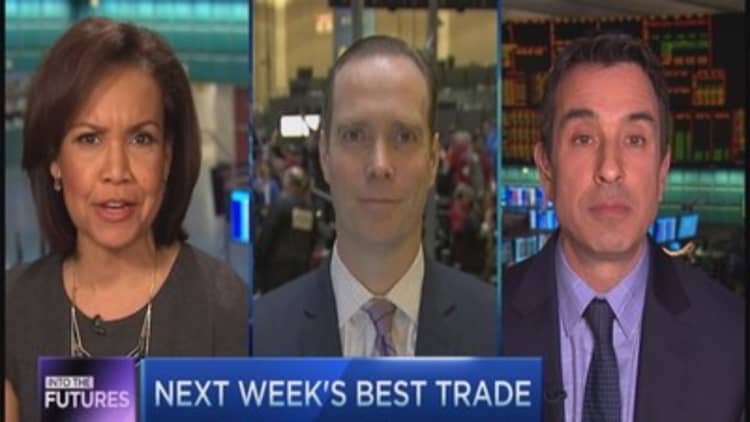
The world just got a bit scarier for risk assets.
On Thursday morning, the Swiss National Bank shocked the world by removing its cap on theagainst the euro, causing its currency to soar and the euro to plunge—and creating fears about more sudden central bank moves. Meanwhile, global growth concerns continue to drive industrial commodities like copper and crude oil to multi-year lows.
Read MoreFallout from the Swiss franc shocker: Gartman
With the U.S. serving as one of the world's few bastions of security and growth, the dollar continues to soar and Treasury yields are plummeting in a bid for safe havens. The question now: How long can America continue to shine in an increasingly uncertain and slow-growing world?
A key clue could come in the week ahead, as a slate of major companies report their fourth-quarter results and release forward guidance. Most closely watched will be energy companies like Halliburton and Baker Hughes, consumer discretionary names like Starbucks and McDonald's, and industrial giants like GE.
The overarching questions will be whether the soaring dollar and plunging energy prices are helping or hurting—and just how much the weakening global environment is a concern for corporate managers.
"What I'm going to be watching for is some clarity from the companies in terms of the decline in the price of oil, and the decline of interest rates and the rise of the dollar," said John Conlon, chief investment officer at People's United Bank. "I'm going to see if there's some consensus developing in terms of the price of oil and interest rates."
Consumers 'not stupid' with oil bounty
Thus far, the "blended" estimate for fourth quarter earnings growth (which combines reported earnings with analyst estimates for yet-to-be-reported earnings) stands at a meager 0.6 percent, according to FactSet. That's down from 1.7 percent on December 31st, mostly due to misses from Citigroup, Bank of America and JPMorgan Chase.
It's worth noting that since more companies beat than miss, actual earnings growth tends to be prettier than the estimates. But if the growth rate does stand at 0.6 percent after the dust has settled, that would mark the slowest earnings growth since the third quarter of 2012, when companies reported an earnings decline of 1 percent.
Much of that drop is due to the battered energy sector, hit by the deep plunge in oil prices. Ex-energy, estimated S&P 500 earnings growth stands at 3.2 percent, according to FactSet senior earnings analyst John Butters. Yet its unclear if energy company losses will be consumer companies' gain.
"The consumer is not stupid; actually, the consumer is rather smart. They realize that oil at $45 is not going to last, so the discount they're currently getting at the gasoline pump is not going to last," Conlon said. "So they're not going to take these savings and immediately spending that."
So far so good?
Of course, oil is not just a major cost for consumers—it's also a big cost for many businesses. The fall in energy costs is one of the reasons that PNC Financial Services Group senior economist Gus Faucher is so optimistic about what 2015 will bring.
"Firms are highly profitable right now. Labor costs are under control, they are able to increase prices somewhat, and most industries are going to benefit from lower energy costs," he said.
Additionally, Faucher doesn't believe that the rest of the world's problems are a major threat to America.
"The underlying fundamentals for the U.S. look very good, so if growth does slow further oversees, it will certainly be a drag on growth," he said. However, "growth will still be above trend, and we'll still get an improvement in the labor market."
So, can the U.S. continue to grow while the rest of the flounders?
"The evidence so far has shown that we can," Conlon points out.
—By CNBC's Alex Rosenberg.
Watch "Futures Now" Tuesdays & Thursdays 1 p.m. ET exclusively on FuturesNow.CNBC.com!



